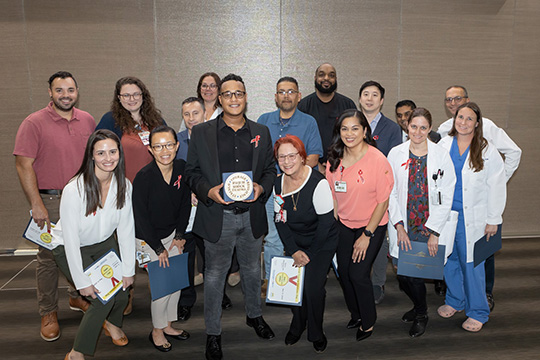“The nurses were totally cool and made me feel safe the entire time,” he said. “I have even more respect for them now than I already did.”

Justin Flax’s last memory of November 9, 2022 was saying goodbye to his classmates at JFK – Muhlenberg School of Nursing after his final class of the day. What happened in the coming hours and days only comes back to him in flashbacks and accounts of what others told him.
He was driving home when a rear tire blew out on his car, causing it to spin out into the opposite lane. Another car struck Justin’s car broadside. The car caught fire and a good Samaritan who happened to have a fire extinguisher in his vehicle put the fire out. First responders needed to break the back window of Justin’s car to free him.
Justin suffered severe, traumatic internal injuries including a ruptured diaphragm, fractured pelvis and a fractured jaw. He was rushed to Robert Wood Johnson University Hospital’s Level I Trauma Center, one of only three designated Level I Trauma Centers in New Jersey. Once there, he was under the expert care of the Shock Trauma Team at RWJUH and Rutgers Robert Wood Johnson Medical School (RWJMS).
“For patients like Justin - who was, quite literally, injured from head to toe - an experienced, multidisciplinary trauma team is crucial,” said Joelle Getrajdman, MD, Assistant Professor of Surgery at RWJMS and Justin’s lead Trauma Surgeon at RWJUH. “The presence of multiple skilled providers of various specialties is essential for the proper management of each individual injury. The team ensures that the patient's injuries are triaged and handled in the safest, most expeditious manner possible. From the moment the patient hits the hospital doors until discharge, the team is in constant communication.”
The Level I Trauma Center at RWJUH is a leader in providing life-saving trauma care to New Jersey residents. The center cares for nearly 3,000 trauma patients annually in an Emergency Department that sees nearly 90,000 patients each year. In addition to treating the seriously injured, clinical faculty affiliated with the Level I Trauma Center at RWJUH and RWJMS conduct research and educate other health care professionals about the most recent advances in trauma care.
“The RWJUH and RWJMS Trauma Program is comprised of providers who are knowledgeable, skilled, and experienced,” Dr. Getrajdman explained. “However, the team's overwhelming dedication and passion for taking care of highly injured patients is what makes them special.”
Once the Trauma Team stabilized him, Justin underwent multiple surgeries to repair his diaphragm, pelvis and jaw among other injuries. He was at RWJUH for 10 days and could not walk for almost three months.
“I don’t remember the accident at all,” Justin said. “I remember waking up in the ICU room and didn’t know what was going on. I had all this stuff in my stomach and I was intubated. I had to write everything down to communicate.”
After a long and sometimes grueling physical therapy regimen, he is now walking on his own and plans to resume nursing school next fall. Despite the physical challenges he faces and having his studies interrupted, Justin remains positive and focused on his future. He is confident that this experience will ultimately make him a “better, more empathetic nurse.”
Justin has nothing but praise for his care team, especially the nurses in the Trauma ICU and on 9 Tower.
“The nurses were totally cool and made me feel safe the entire time,” he said. “I have even more respect for them now than I already did.”
During nursing school, Justin worked as a Clinical Care Technician in a hospital ICU, where he took care of patients with hip injuries. Finding himself in that same position was both humbling and eye-opening.
“As a tech I took care of patients with bad hips,” Justin noted. “For the life of me, I couldn’t even get myself set on a bed pan. I have a much a better knowledge of what these patients are going through.”
Once Justin was discharged, he remembers the simple pleasures of returning home that helped him heal, specifically, his grandmother’s “Old-school, Dominican-style, simple chicken broth.”
“She makes it with love and that’s what I really needed when I got back home,” he recalled.
He also credits his mother, Sandra Vargas, an RWJUH Nurse, and his girlfriend, Deysi Macario, with helping him with his basic needs when he returned home.
During physical therapy, Justin had to re-learn the basics, including simply lifting his legs and how to get himself into a wheelchair. After two months, he was able to walk with a cane. Now, he is walking on his own and working to regain the strength he had before the accident.
“I know it’s important for me to stay active, eat a lot of protein and work on my core (muscles) as much as I can,” Justin said. “I want to be able to run again and go hiking - I hated cardio before!”
Justin knows that it’s important to not rush the recovery process.
“I still have restrictions, but I just want to get back to normal and put this behind me,” he said. “I know that this will make me a better nurse and a better person for sure.”
Justin was honored at RWJUH and RWJMS’s Shock Trauma Program Trauma Survivors Day celebration. He was thankful for the opportunity to see and thank his caregivers again.
“I was really grateful to be honored and be able to show my appreciation and gratitude to everyone who worked so hard to keep me alive,” Justin said. “It’s a great feeling knowing that me being here is a representation of the work that they did and shows anyone else going through something like this that they can still make it out.”